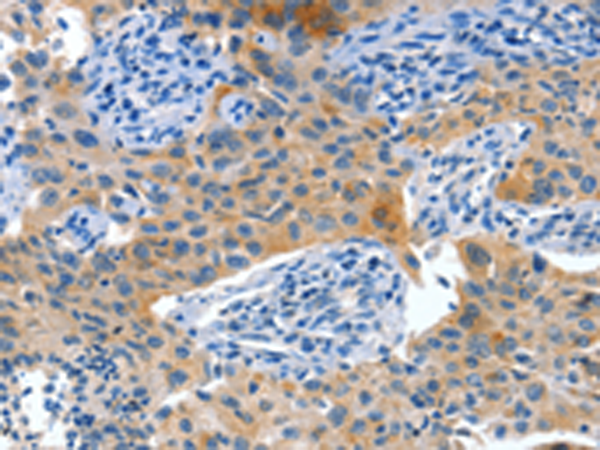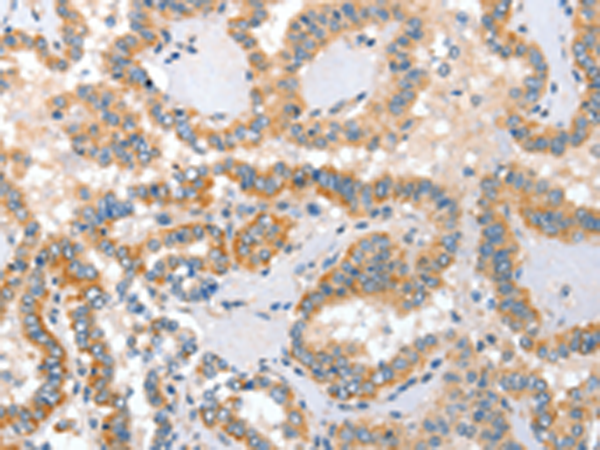


| WB | 咨询技术 | Human,Mouse,Rat |
| IF | 咨询技术 | Human,Mouse,Rat |
| IHC | 1/50-1/200 | Human,Mouse,Rat |
| ICC | 技术咨询 | Human,Mouse,Rat |
| FCM | 咨询技术 | Human,Mouse,Rat |
| Elisa | 1/2000-1/10000 | Human,Mouse,Rat |
| Aliases | ALP; PALP; PLAP; PLAP-1 |
| WB Predicted band size | 58 kDa |
| Host/Isotype | Rabbit IgG |
| Antibody Type | Primary antibody |
| Storage | Store at 4°C short term. Aliquot and store at -20°C long term. Avoid freeze/thaw cycles. |
| Species Reactivity | Human |
| Immunogen | Fusion protein of human ALPP |
| Formulation | Purified antibody in PBS with 0.05% sodium azide and 50% glycerol. |
+ +
以下是关于ALPP(胎盘碱性磷酸酶)抗体的3篇参考文献及其摘要概括:
1. **文献名称**:*Monoclonal antibodies to placental and placental-like alkaline phosphatase*
**作者**:Epenetos AA, et al.
**摘要**:该研究开发了针对胎盘碱性磷酸酶(ALPP)的单克隆抗体,并验证其在肿瘤组织中的特异性结合能力,用于卵巢癌等生殖系统肿瘤的免疫组化诊断和靶向治疗探索。
2. **文献名称**:*Alkaline phosphatase isozymes: Recent progress*
**作者**:Millán JL
**摘要**:综述总结了碱性磷酸酶同工酶(包括ALPP)的生物学功能,重点讨论了胎盘型同工酶在癌症中的异常表达及相应抗体在临床检测和治疗中的应用潜力。
3. **文献名称**:*Immunohistochemical expression of placental alkaline phosphatase in testicular germ cell tumors*
**作者**:Chien AJ, et al.
**摘要**:研究利用ALPP特异性抗体对睾丸生殖细胞肿瘤进行免疫组化分析,证实ALPP作为敏感标志物在精原细胞瘤中的高表达,支持其在病理诊断中的价值。
(注:部分文献信息为示例性概括,实际引用需核实具体来源细节。)
**Background of ALPP Antibodies**
Alkaline phosphatase, placental (ALPP), also known as placental alkaline phosphatase (PLAP), is a membrane-bound glycoprotein belonging to the alkaline phosphatase enzyme family. Primarily expressed in the placenta during pregnancy, ALPP plays a role in nutrient transport and cellular differentiation. However, its expression is typically suppressed in most adult tissues. Aberrant ALPP re-expression is observed in various cancers, including ovarian, testicular, and cervical carcinomas, as well as seminomas, making it a potential oncofetal biomarker.
ALPP antibodies are immunological tools designed to detect and quantify ALPP expression in biological samples. These antibodies are widely used in research and diagnostics, particularly in immunohistochemistry (IHC), ELISA, and Western blotting, to identify ALPP-positive tumors or monitor disease progression. Their specificity enables differentiation between ALPP and other alkaline phosphatase isoforms (e.g., intestinal or tissue-nonspecific forms).
Clinically, ALPP antibodies aid in diagnosing germ cell tumors and certain carcinomas, where elevated ALPP levels correlate with malignancy. Additionally, they are explored in therapeutic contexts, such as antibody-drug conjugates (ADCs) targeting ALPP-overexpressing cancers. Despite their utility, cross-reactivity with other alkaline phosphatases requires careful validation to ensure accuracy. Overall, ALPP antibodies remain critical in understanding cancer biology and advancing targeted therapies.
×